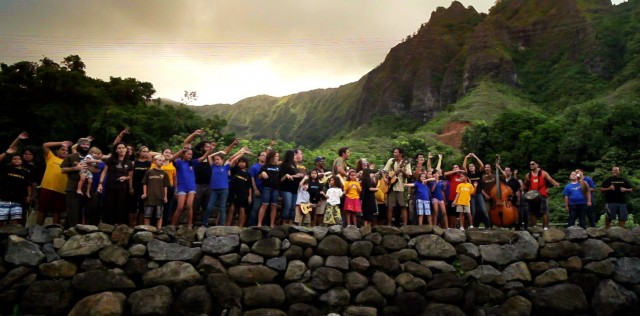Mana Maoli continually strives toward fulfilling our vision and mission via our Mana Mele program, and as the supporting 501(c)3 nonprofit of our Public Charter School – Hālau Kū Māna. While parents, kupuna (elders), educators, musicians and other adult community members serve and benefit from our programs in various ways, our focus is on engaging and serving our ʻopio, or youth.

Mana Maoli’s Programs
We provide human, land and financial assets to the following three programs as our way of continually striving toward our vision:
The Mana Mele Project
This program is all about innovation and positive music in support of initiatives aligned with Mana Maoli’s vision and purpose. Currently, our Maoli Music program is primarily volunteer-driven, and hundreds of artists – who we refer to as the ‘Mana Maoli Collective’ – have donated their time and talent in support. Our contributing artists range from student and underground prodigies to Hawaiiʻs favorite and most respected artists of various genres, such as Aunty Genoa Keawe, John Cruz, Jack Johnson, Paula Fuga, Amy Hanaialiʻi Gilliom, Makaha Sons, Ooklah the Moc, Natural Vibes, Anuhea, Sudden Rush, Kaumakaʻiwa Kanakaʻole, and many more.
Learn more about this program »
Hālau Kū Māna Public Charter School
Community, culture, and kaina (land/ocean)-based education for middle and high school students. With expectations of both academic and cultural rigor, students are more responsive to hands-on, inter-disciplinary learning that has relevance to the host culture, environment, history, and contemporary issues and opportunities.
The effectiveness of the school is evident through students’ massive turnarounds in attendance, academics, and behavior, while demonstrating a strong sense of cultural grounding and leadership abilities. Rather than separate classes for each class subject, students spend over 20 hours each week in a project that spans the entire school year. Whether they are in the waʻa (sailing canoe), loko iʻa (traditional fishpond), or loʻi (traditional agriculture) projects, they do the related reading, writing, discussion and research to meet language arts standards.
Students also study the sciences and social studies related to the theme of their project (botany and earth science for loʻi project, chemistry for loko iʻa project, physics and astronomy for waʻa project), and so on. By blending traditional methods of land management with the relevant western sciences we are able to nurture students who are grounded in their culture, yet able to navigate in this ever-changing global society.
Visit HKM’s website: halaukumana.org
